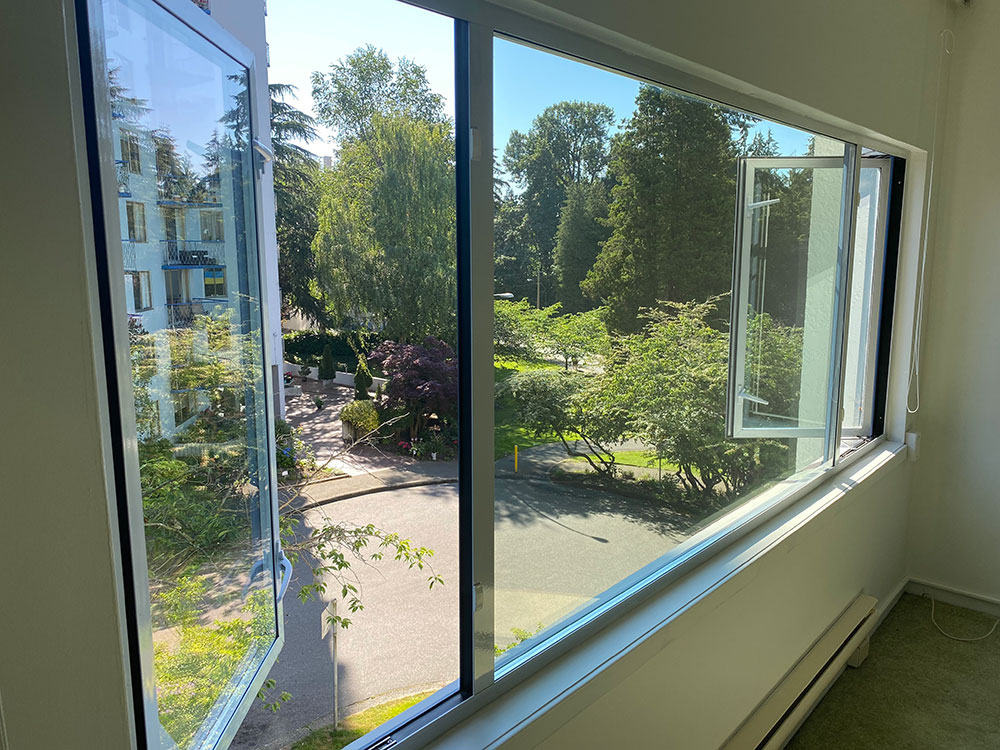The year 2022 was a strange year in all kinds of different ways.
Last year at this time, I was house sitting for a friend and about ready to give up on finding an apartment in Vancouver. Between then and now, a lot happened. Some of it was good, some was not, but mostly it was a mixture of highs, lows, extremities and insularities. Complex, in a word.
Looking back, the sequence of events that led to where I am now unfolded like fate decided to give me a break. “Here,” said the universe. “Quit your boobery and get it together.”
When I wake up in the morning, the fact that I can see Stanley Park from my window still astounds. Do I really get to live here? Really!? Holy smokes.
It’s hard to stay in this place of wonderment and gratitude. The ongoing ordinary demands of buying groceries, checking the mail, work, dishes, laundry — all the thousands of little daily tasks distract and distance a body.
But occasionally something comes along that reminds me of how one simple thing can make a world of difference.
That thing is running.
At different times in my life, running has been a means to figure things out. A time and space away from computer screens, the tugging demands of daily life. A place to work things out and make straight that which feels tangled and torturous.
The feeling is a bit akin to being on an airplane: a similar sense of being suspended from the normal world, except that instead of a jet plane, it’s just your own two humble feet, plodding along.
I wrote about running with my sister way back in 2006, which seems like an entire other lifetime ago. We were both at turning points, and in the darkness of the early morning, we ran and talked, trying to figure things out.
It was an important part of my life, but at some point, I just stopped. There were a couple of different reasons. My Achilles tendon blew out, my sister moved out of town. There was a global pandemic that shrank the world.
But life keeps going. And when I moved to the new apartment with the park right there, there wasn’t any excuse. My neighbour suggested that we ramble along the park trails Monday, Wednesday and Friday. And we have. Even if it’s dark, cold and occasionally very slippery, the experience of being in the park early in the morning is pure unfettered joy.
The other thing about running that is very unlike being on a plane, is that you’re entirely enmeshed in the world. Looking at it, smelling it, feeling it, taking it all in. Then there’s the fragrance of cedars, wet earth, cold air, the ocean, rain and occasionally snow. Last month, a lot of snow!
In the early morning darkness, under the canopy of trees, you can barely see your hand in front of your face. A coyote walked across the path the other day, without even bothering to give a glance at the humans that had entered its domain.
I don’t know why I have to keep relearning this, but being out in the morning, moving your old creaky bod, makes a world of difference. Not only to how you feel, but also how you think.
Running as writing, writing as running
The other thing that cemented my desire to run again was Haruki Murakami’s new collection of essays Novelist as a Vocation. Although it’s not the most exciting title, it’s a fascinating book. The essays take the work of writing novels as their initial point of departure but then expand outwards in concentric ripples to encompass all kinds of different things. Luck, inspiration, education, awards, relationships with other writers. There is a lot of personal history as well. All of it offered in a self-deprecating, funny way that makes the author feel like someone you already know or at least wish you knew.
One of the points Murakami makes is that creative work demands stamina and endurance. In order to support his writing, Murakami runs every day. As he explains, it is non-negotiable, something that he does like getting dressed, eating food, sleeping — the stuff that is necessary for life.
Sitting at a desk for a good chunk of the day and fussing with words might not sound like the most demanding job. It’s not like chopping down trees or hauling heavy fishing nets from loden green waters. But the work of creating, of generating something from nothing is surprisingly taxing. All you have are random synapses firing in the greyish pink lump perched atop your spinal column. Like growing a word baby inside your head and getting it out on the page, relatively intact, it’s labour.
Even now, sitting here, words don’t always come when they’re called. They’re like cats that way. They will sneak onto your lap and want attention when you’re trying to do other things. But when you want them to work, they saunter off, taking the time to knock a water glass onto the floor as they leave.
But running makes writing strangely easier. You can wrestle with stuff all day long and get nowhere. But sometimes if you tuck a problem away in a distant corner of your skull, lace up your shoes and head outside, the Gordian knot undoes itself while you’re not even paying attention.
I used to liken the process to blasting all the plaque out of one’s head so that things flowed more freely and easily. These days, it’s a little less like blasting, and more like whittling, a slower, more methodical pace that allows the thing you’re trying to solve reveal itself. At least sometimes.
‘Inspiration exists, but it has to find you working'
Back to Murakami.
One of the things that struck me reading the collection of essays was the necessity of trying as hard as you can in the process of making something. Here is where the endurance part comes in. Having the energy, clarity and stamina to keep going. Even if you get tired, to come back and try again. To try to make it better.
Novelist as a Vocation is plainspoken, deeply humble and idiosyncratic. It is also extremely practical. And maybe that’s what I like most about it.
In addition to running, Murakami draws parallels to other kinds of physical stuff. As he writes: “I felt very strongly that paying close attention to what the body is feeling is, fundamentally, a critical process for someone involved in creative work. Whether it’s the emotions or the brain, they’re all equally part of our physical body. I don’t know what physiologists say about this, but to me, the lines separating the emotional, the mental, and the physical aren’t all that clearly defined.”
It’s an idea that came up a number of times in my interviews with writers this year. Gabor Maté and Ann-Marie MacDonald each have their own ways of dealing with the physical demands of writing for a living.
Although Murakami’s book is about the work of being a novelist, his approach and advice apply to any creative pursuit. As Picasso famously said, “Inspiration exists, but it has to find you working.”
Back to the body
To be frank, there are days when I would rather do anything else other than write. In which case, I do something else. Draw, cook, fold laundry, play some music, go for a walk, anything really. David Beers, The Tyee’s founding smarty pants, calls this “dish pit thinking.” Even when you’re not actively engaged in the actual process of writing, words are assembling themselves. Internal mechanisms are spinning and connecting, like a Rube Goldberg contraption full of old bedsprings, cuckoo clocks and golf balls.
This week I accidentally stumbled across Terry Eagleton’s phrase, “Capitalism plunders the sensuality of the body,” in a few different places. It reminded me, again, that the world moves in mysterious ways. It’s a truism that pops up in Murakami’s book when he describes the epiphanies that changed the course of his life, arriving randomly out of a clear blue sky at a baseball game or in the fluttering heart of a wounded bird.
The important part is paying attention to these signs and signals. Here is where running is critical. As Murakami explains: “For a long time I myself wasn’t exactly sure what it meant to me to run every day…. But as I run, I feel that’s not all there is to it. There’s something more important deeper down in running. But it’s not at all clear to me what that something is, and if I don’t understand it myself, then I can’t explain it to others.”
Running reminds me that everything comes through and is mediated by physical experience. We are bodily beings, taking in everything — food, films, books, music, food, dance, art — through our external portals. We’re porous creatures, open and alive to what we take in.
So here, at the turn of the year, take a moment to contemplate the span of events. Sit quietly with your own body and think about all there is to be thankful for.
In my darker moments, I used to make lists of things that made me happy. It’s a motley collection but I’m sure everyone has similar stuff that bring pleasure and a certain determination to continue, if only to experience the ordinary, extraordinary things of this thing we call existence.
I continue to be grateful for Mozart’s Don Giovanni, Wagner’s Ring Cycle. Singers like Swedish tenor Jussi Björling and Swedish soprano Birgit Nilsson, ‘80s hits, ‘90s hip-hop, the New York Dolls, the list goes on. Thrillers from the mid-‘90s starring Sandra Bullock, Argentinian perfume (seriously, if anyone can hook me up with Fueguia 1833, please get in touch), Grade 4 jokes that still make me and my sister laugh. Pasta of any kid. Cheese, but only the fancy stuff. I kid, any kind of cheese is gladly accepted. Crabs, lobsters, sea creatures of any spot or stripe, yes, please. Not to eat, well, occasionally, but mostly to look at: so beautiful.
Really, there is an incredible number of things that make life not only pleasurable, but heady with goodness. Gratitude isn’t quite enough of a word to contain these feelings, but the trot around the park is a reminder to be thankful for all the odd twists and turns.
So, thanks life, you’re alright. ![]()

















Tyee Commenting Guidelines
Comments that violate guidelines risk being deleted, and violations may result in a temporary or permanent user ban. Maintain the spirit of good conversation to stay in the discussion.
*Please note The Tyee is not a forum for spreading misinformation about COVID-19, denying its existence or minimizing its risk to public health.
Do:
Do not: